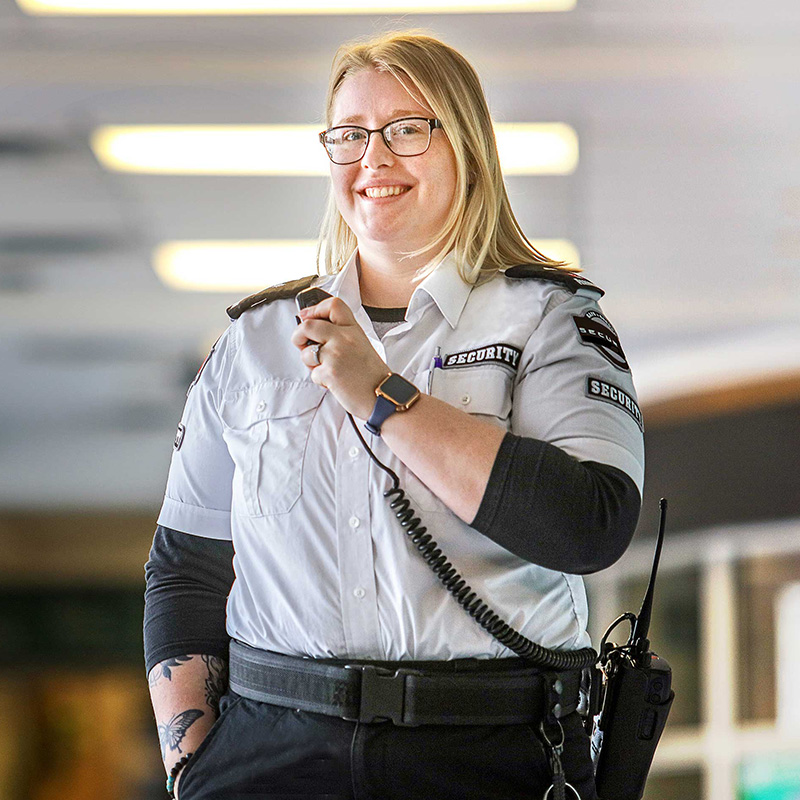Graduate Spotlight: J. Sarah Armstrong
J. Sarah Armstrong is dedicated to lifelong learning and community empowerment.
Before arriving at Durham College (DC), her many post-secondary accomplishments included an Honours Bachelor of Science Degree with a major in biochemistry and a minor in mathematics, a Diploma in Massage Therapy, and Graduate Certificates in Professional Accounting, and Fraud Examination and Forensic Accounting.
When she crosses the stage at Convocation, she’ll add a diploma in Paralegal studies to that impressive list.
In advance of that, she spoke to us about discovering her true calling in legal advocacy, and how DC is unlike any other school.
Why did you decide to attend Durham College?
During the pandemic I made the decision to change my career, as I was in an industry that was greatly affected by the closures, and I had children doing school online at home. After two years of education at another college, I decided to move to DC to complete my legal studies. I was pleasantly surprised that DC, my own community college, was listed in the top five schools that provided paralegal programs in Canada (and friends of mine raved about the community feel of the Oshawa campus).
What was your DC experience like?
Finding a sense of home at DC was a pivotal part of my journey. Balancing single parenting with the demands of law studies tested my time management skills, but the growth and fulfillment I gained made it entirely worthwhile. My friends were not wrong; the campus had a community feeling that facilitated connecting with peers and professors. I found like-minded people in my program and found the faculty to be truly invested in the students’ journey to success. My experience at DC helped me grow both personally and professionally and affirmed that advocacy is a meaningful and impactful pursuit. In reinventing my career by returning to school, I also transformed personally—gaining confidence and discovering a true passion for the law.
How did your DC program prepare you for your career?
DC connected me with mentors in the field; professors who are currently practicing law and modeled different approaches to working in the legal field. There were opportunities on campus that extended past the classroom, and in connecting with passionate professors, I also was able to engage in off campus activities that broadened my understanding and challenged me to unlearn some long-held biases. I am very grateful that they encouraged and supported me in competing in intramural mooting (litigation) competitions, which allowed me to network with respected people in the field, prior to graduation. Competing for DC was an honour, and I plan to pay that forward by participating in alumni activities in the future. For now, my academic path is finished, and I will move into the legal field with a passion for advocacy, and a focus on addressing inequities that impact access to justice.
Would you recommend your DC program to other students?
Absolutely! Durham College has a very good reputation for producing graduates that are well respected in the legal field and has a rich campus life. Whether students plan to become licensed paralegals or simply use the education to improve their career journey and their advocacy skills, it is a beneficial program to complete.
What is your advice for future students?
For people who are rebuilding their life after separation and divorce, it is never too late to start over. It’s never too late to change directions and explore something new. There are so many rewarding aspects of going to college beyond the academics, and even if you don’t know exactly where to start, start somewhere, come to the campus and explore the options. Don’t be afraid to approach faculty — they are rooting for your success. I also suggest that future students engage in activities outside the classroom, to allow building a sense of community, and organically apply their new skills in real time. The social and intramural activities give an added layer of feeling at home on campus.
What do you love most about DC?
Community! Over my prior post-secondary career, I had taken programs at three other colleges/universities – but DC is the first campus where I felt a deep sense of connected community. That makes a big difference to the academic experience. At DC I felt like I had a seat at the table, that my voice was heard and valued.
How do you feel about graduating?
I feel immensely proud of how far I’ve come. Choosing to reinvent my professional path, as I approached 50, initially felt uncertain and daunting. But now, standing on the other side of graduation, I’m deeply grateful I took the leap. In pursuing something new, I unexpectedly discovered my true calling—law. I think it is important for my children to see that it is never too late to pivot to a new chapter, that learning and studying can be a lifelong adventure that brings you to the next right place.
What are your future goals?
My plan includes sitting for the Law Society of Ontario licensing exams to allow me to practice law in Ontario as a Paralegal. I am keeping an open mind about what area of law I will pursue. My interest in Human Rights law overlaps many jurisdictions of law and legal advocacy. I have not ruled out proceeding to law school in my future – but time will tell, and practicing as a Paralegal may bring me to new goals not yet identified. I am committed to advocating for meaningful reforms—both incremental and wide-reaching—to eliminate barriers to access to justice.
Every year, DC celebrates thousands of career-ready graduates. Read more grad stories about how DC has helped them thrive.



